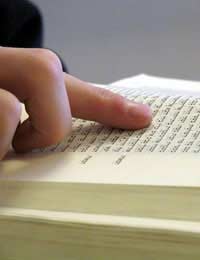How to Get a Place at a Religious School

Religious schools - or Faith Schools - as they are becoming known, are different from mainstream schools in that they will offer not only the National Curriculum but also specific instruction in the teachings of a particular religion.
Religious schools offer teachings with reference to a particular religion in a community or locale, but only on agreement with local residents and the local education authority.
It is worth noting at this point, that faith schools may be voluntary-aided, which means that a governing body different from the local education authority is responsible for overseeing the admissions process and is therefore responsible for the intake in a school year.
Admissions Process
There is really little difference between a religious school and a mainstream school when it comes to the admissions process. You may find this surprising, given that faith schools teach specific religious criteria, but the whole process of applying to have your child placed at the school is no more taxing than applying for a mainstream primary or secondary school.The process would begin in the same way as it would if you were the parent of a child who was intending to send their child to a state run school.
As always, it is advisable to visit the school, or schools, and speak with the head teacher or senior teachers to try to get a feel for the school and how it operates.
Whereas most admissions authorities use a system called 'banding', which is nothing more than a system of random allocation or a 'lottery', faith schools operate on a slightly more direct approach.
As mentioned before, the admissions process differs little from the normal schools' admission code, but they may well ask for evidence that your child or children attends a relevant place of worship, depending on their religion.
This information will be provided either by a minister, a priest, a rabbi or someone of equal stature, depending on the religious nature of the school you wish your child to attend.
Beyond this, the process is remarkably similar to that of mainstream state education. Admission applications and supplementary applications are submitted to the school for their consideration, and this should be done with as much notice as possible.
Unlike mainstream state schools, there are limited placements given the religious aspect of the schooling, so applying in plenty of time is always an advantage.
Likewise, it is useful to speak with your local church representative as they will have doubtlessly had dealings with the school, or schools, in question and will be able to point you in the right direction should you need further information regarding the school.
As with the process of school admissions in general, it can be daunting if you are unfamiliar with it, and with faith schools, that process always seems more so. It is, however, safe to say that the process is no harder, or more stressful, than mainstream state school admissions and it should be looked upon in that way.
With the right preparation, and the right attention to detail, the process should go smoothly, but again it is worth remembering that your child's views are important and relevant in this most important of decision.


Re: What to Include in an Appeal
Hi.We will move to Cardiff during the Summer vacation to be closer to my elderly parents ( having postponed the move twice due to…
Re: The Schools System in the UK
Very useful information. I did not know that there are so many different types of schools in England. I have known only Grammar…
Re: What to Include in an Appeal
My daughter didn t get a place at her first choice of secondaryschool.all her friends from school are going there.since she found…
Re: What to Include in an Appeal
Hello. We applied for a school place- secondary school for our son. We put 2 preferred schools, but he was offered a place in 3th…
Re: Moving from a State Primary to Private Secondary School
Heya. In order to decide meet with the school head teacher. Create a list of good options. Make…
Re: What If My Child Can't Get a Place at Any School in the Area?
Our grandson has not been given a senior school since September 2023 The appeal date…
Re: Sixth Form Applications
Hi, I have done Grade 12 from federal board Pakistan. Now I have migrated to UK. Now I am confused about the courses and admission…
Re: Get a Place at Grammar School
My sons are in year 9 and year 6 and planning to move in june to UK from Spain. In Spain they are in British school. Do they get…
Re: Applying to Private School: Special Needs Child
Hello, My son is 8 years old. He is going to praimary school in year 3. Speech therapist said, He have…
Re: What If My Child Can't Get a Place at Any School in the Area?
Our daughter aged 11 was accepted in to a school 1hr 20mins walking distance (13hrs…